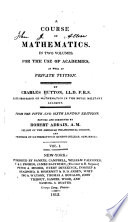 | Alexander Malcolm - 1718 - 396 pages
...fought. Propofition zd, IF four Numbers are in Arithmetical Proportion, whether continued or interrupted; the Sum of the two Extremes is equal to the Sum of the two middle "Terms: And therefore four Numbers with this Property, are Arithmetically proportional.... | |
 | 1811 - 210 pages
...last terms are called the extremes. Note. — In any series of numbers in arithmetical progression, the sum of the two extremes is equal to the sum of any two teni.b equally distant from them; as m the latter of the above series 6 + 1 =» 4 + 3, and... | |
 | Charles Hutton - 1811 - 406 pages
...arithmeticals a, a + d, b, b + d, the sum a + b-}-d = a + b+tf. 2. In any continued. arithmetical progression, the sum of the two extremes is equal to the sum of any two terms at an equal distance from them. Thus, Thus, if the series be 1, 3, 5, 7, 9, II, &c. Then... | |
 | Jeremiah Joyce - 1812 - 274 pages
...term ; as 6, 9, 12, where 6 + 12 = 2 X «f = 18. 2. If four numbers be in arithmetical progression, the sum of the two extremes is equal to the sum of the means; as 5, 8, 11, 14, where 5 + 14 = 8 + 11 = 19. 3. When the number of terms is odd, the double... | |
 | Charles Hutton - 1812 - 620 pages
...arithmeticals a, a + d, b, b +d, the sum a + 6 + d = a + 6+d. 2. In any continued arithmetical progression, the sum of the two extremes is equal to the sum of any two terms at an g qual distance from them, Thus, Thus, if the series be 1, 3, 5, 7, 9, 1 1, &c.... | |
 | Charles Hutton - 1816 - 610 pages
...proportion is containei in the following theorems : 1. When four quantities are in Arithmetical Proportion, the sum of the two extremes is equal to the sum of the tw» means. Thus, in the arkhmetieal 4, 6, 7, 9, the sum 4 + 9=6 + 7=13: and in the arithmciicals a,... | |
 | 1817 - 214 pages
...last terms are called the extremes. JVote. — In any series of numbers in arithmetical progression, the sum of the two extremes is equal to the sum of any two terms equally distant from them ; as in the latter of the above series 6-fl=4-f-3, and=5-{-2.... | |
 | John Bonnycastle - 1818 - 284 pages
...=5i. 2 2 And an arithmetical mean between a and b is . 4. In any continued arithmetical progression, the sum of the two extremes is equal to the sum of any two terms that are equally distant from them, or to double the middie term, when the number of... | |
 | Charles Hutton - 1818 - 646 pages
...the following theorems : THEOREM 1. When four quantities are in arithmetical proportion, the sum uf the two extremes is equal to the sum of the two means. Thus, of the four 2, 4, 6, 8, here 2 48 = 4+6=10. THEOREM 2. ln any continued arithmetical progression,... | |
 | Charles Hutton - 1822 - 616 pages
...arithmetical:, a, a+<f, b, b-\-d, the sum a+b+d=a+b+d. 1. In any continued arithmetical progression, the sum of the two extremes is equal to the sum of any two terms at an equal distance from them. Thus, if the series be 1, 3, 6, 7, 9, 1 1, fee. Then... | |
| |